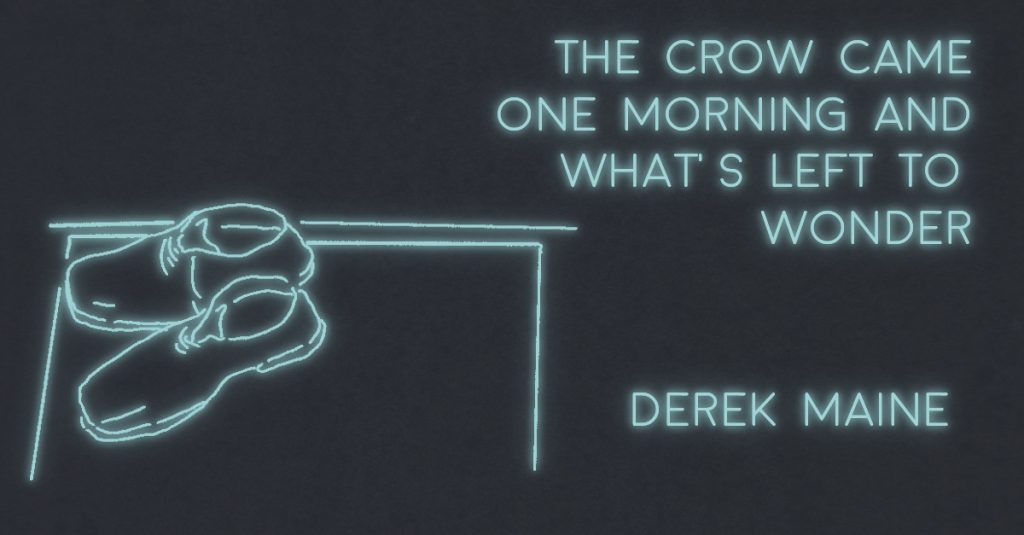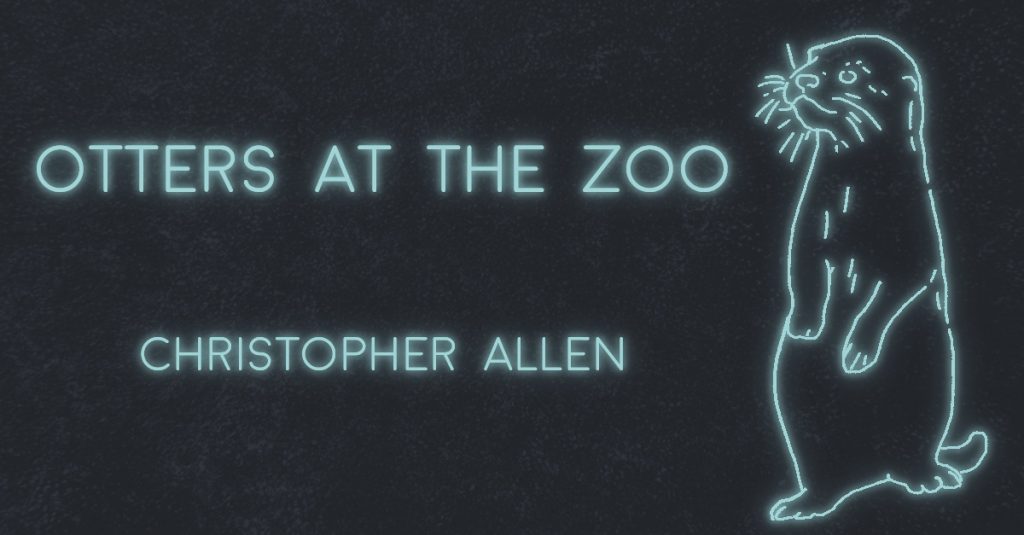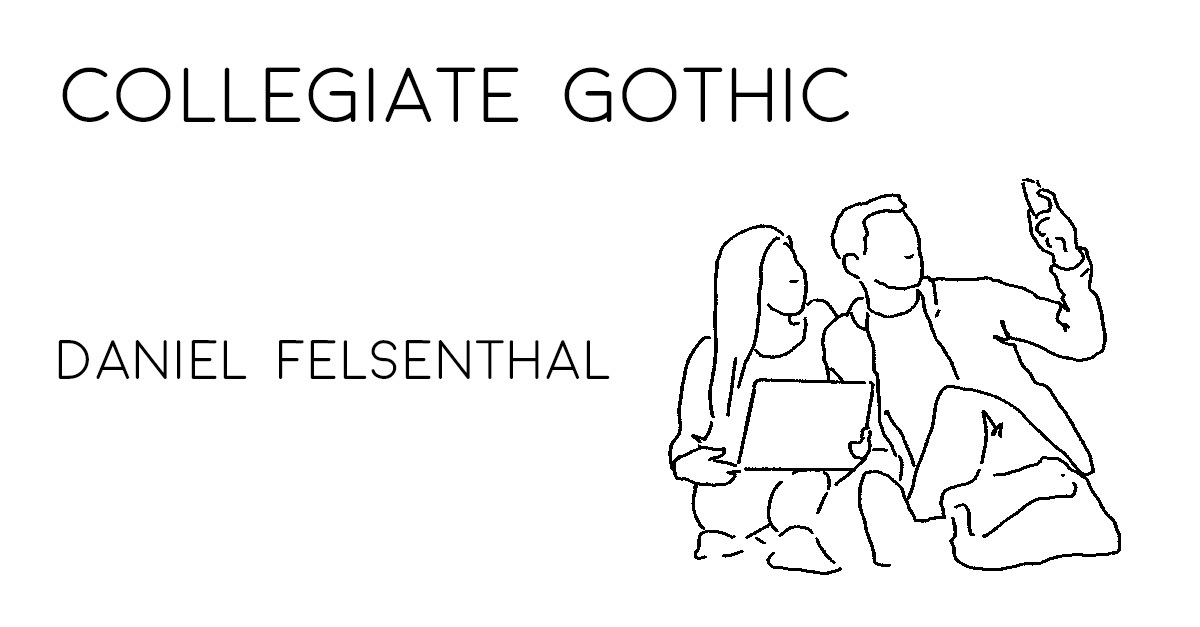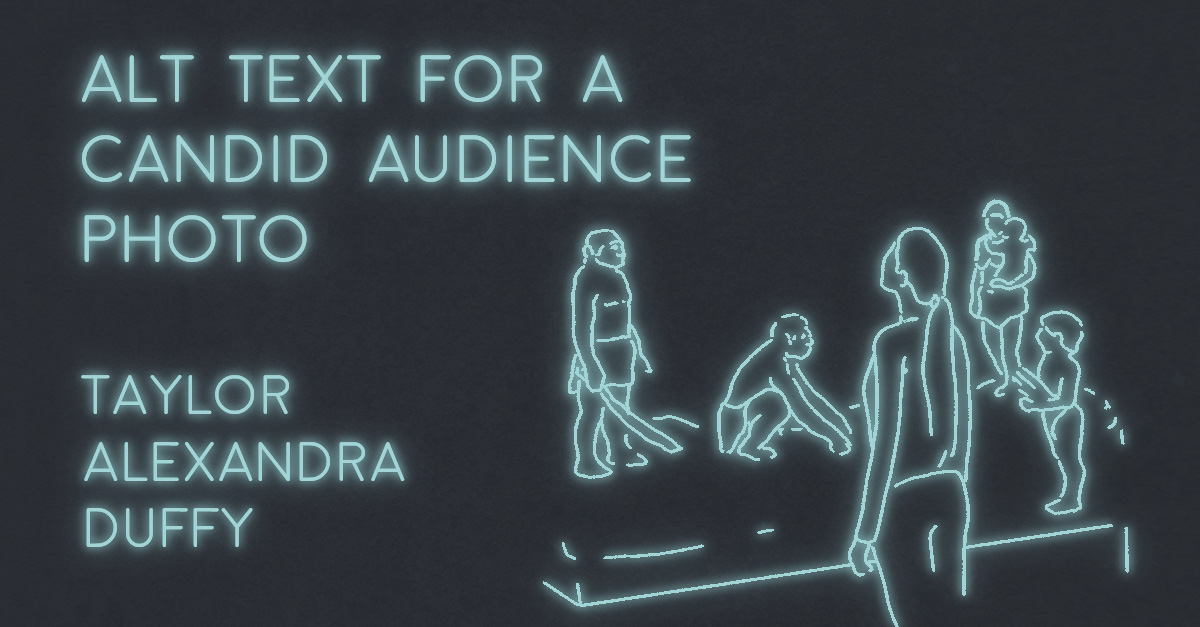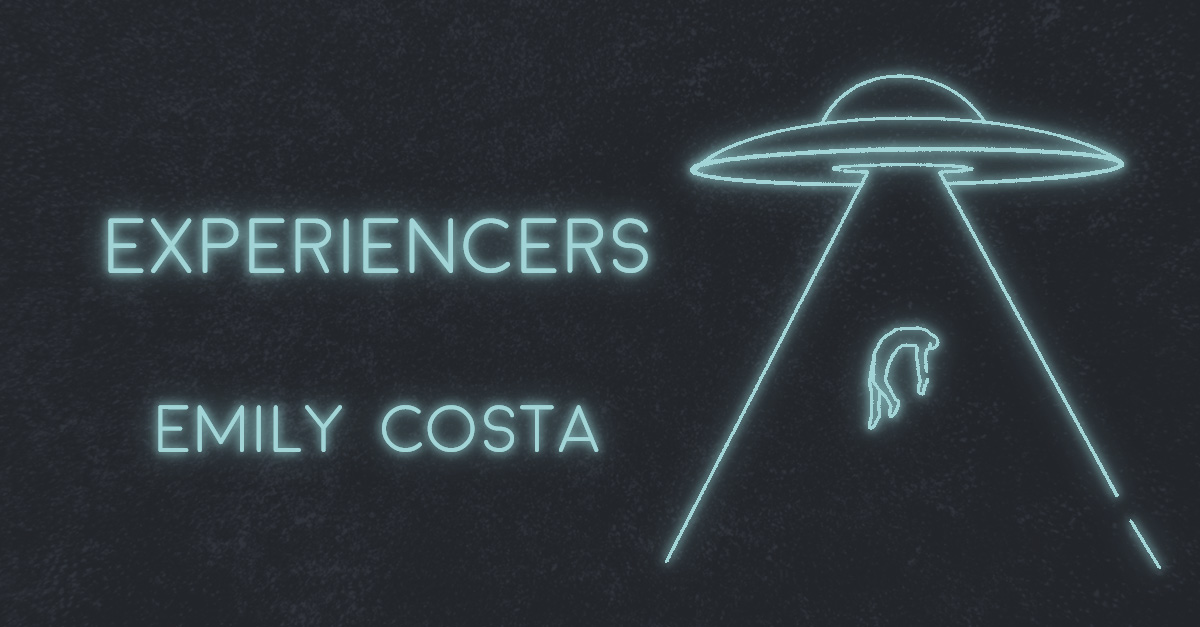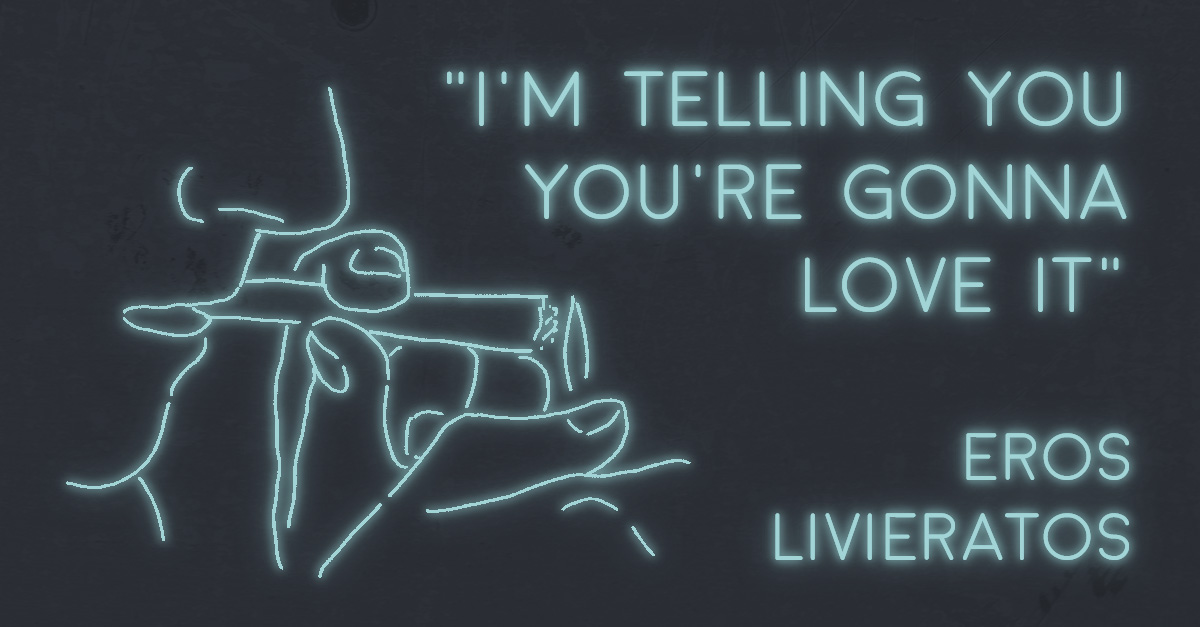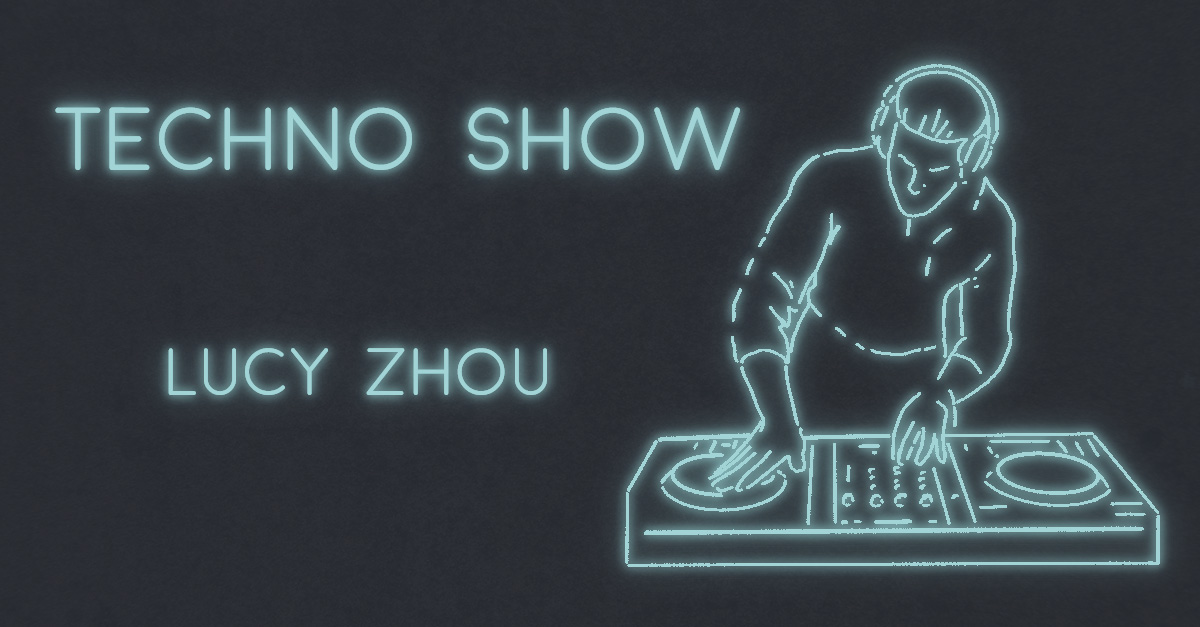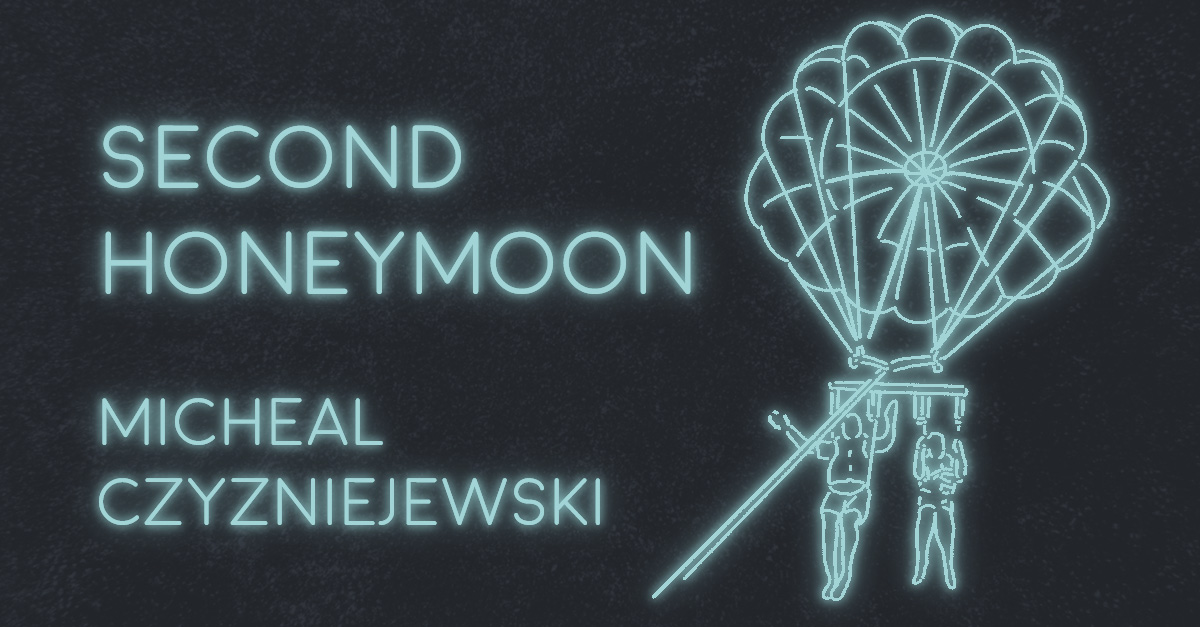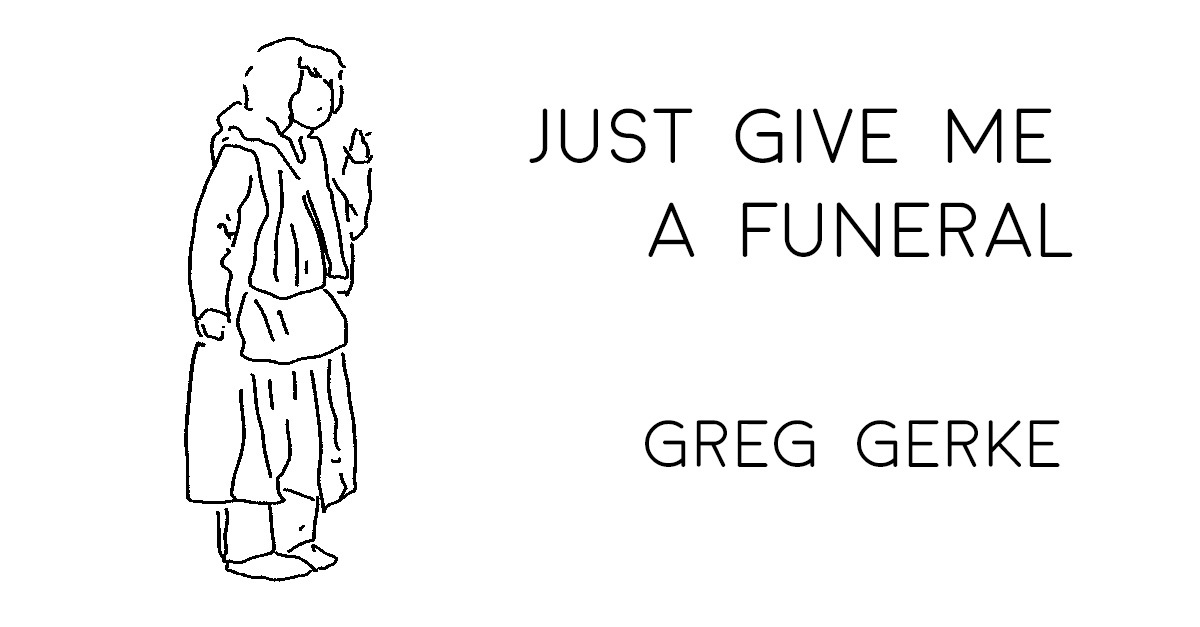Summer
I met Miles on move-in day after my advising troop finished doing icebreakers and trust falls. Actually, I met his dad first.
“Herman Kahn,” said a man wearing a fleece embroidered with the mascot of our university on the breast, and beneath it, the words Class of ‘72. He extended his hand as though he were a freshman himself, but looked at his son, and their dance gave the impression of a family whose dynamics were more important than people outside of the family.
“Miles! Care enough about someone other than yourself to meet your neighbor?”
“I told you not to wear that stupid fleece, Dad. You’re embarrassing me.” Miles’ eyes hardly passed over mine, “Hi,” and then he turned back to Herman, “Please leave before I never talk to you again.”
My parents would disown me if I acted so rude, but Herman obeyed.
“Wanna go to a party?” Miles asked.
He learned from his older sister, also an alumnus of our university, that freshmen usually go out in large, aimless-seeming packs, so we should assemble a group.
“A group of girls,” he clarified. “More than one penis in a room is practically a gay club around here.”
Unlike Herman, Miles wore a yarmulke. I thought religiosity got squeezed out with each generation by America, sex, capitalism, and the same festering animosity that led Miles and his dad to scream at one another. Or at least this was the case in my family. The children of churchgoers mostly seemed to stop believing in God around the same time we stopped believing in Santa Claus. Still, we maintained a basic respect for our parents’ authority. Miles, on the other hand, became a religious Jew after his parents split up, when he got close to a youth group leader at his temple, and he despised his dad, blamed him for divorcing his mom and messing up his childhood, which was a doubly fraught perspective since he’d come to Herman’s alma mater.
“I was shut out of the other Ivies,” Miles explained to me.
I was accepted by a few, but went here because it was the only school that offered me enough financial aid.
Maybe Miles’ family legacy accounted for his self-confidence. He acted like a bro with other guys, but surprisingly, charmed the finer sex. Enough girls jammed into his room that a few people had to stand on his bed while we passed around a fifth of Belvedere his mom gave him as a present for being salutatorian of his high school class. Everyone smiled and wanted to be liked by everyone else, and people who would never have spoken to me in high school were so friendly that it felt as though going to the same school were a bigger commonality than being of the same race, or faith, or having the same amount of money.
“Miles acts this way because he is Jewish,” my mom would tell me, if she and my dad were here. But they left that morning, so I pushed her prejudices out of my brain.
Walking to the frats, we passed around an Ocean Spray bottle of orange juice we spiked with the rest of the liquor. Miles led us up the steps and past the scratched, peeling columns of the mansion where the brothers of Rho Beta Rho lived and drank. One yelled, “If you have less than four girls for every guy, you’re not going to get into our party.”
“That’s insane,” Alicia told the bouncer, a bearded sophomore.
Luckily, we got in before she vomited and Sarah took her home.
The brothers invited us upstairs to smoke a joint, probably because they were trying to woo Miles. It was the second time I’d gotten high in my life, an opportunity that never arose until last summer.
My roommate, Rizwan, came and went all the next morning, chatting on the phone in Arabic, but apologized for waking me. The only furniture he brought was the rug he lay between his desk and bed. He wanted to hang out with Miles and me, and Miles was polite, yet cool—and sort of unfriendly.
The two of us got drunk on a few bottles of Petite Sirah he stole from his stepdad, who had a beach house in the Hamptons with a wine cellar. At a party thrown by Tau Tau Tau, we danced on every girl not surrounded by a protective shield of friends. Someone wearing a shot glass as a necklace kissed me, and when she backed my body across the dance floor and into a wood panel beneath the stuffed head of a moose, I slipped my hand under her waistband. She was wet, and pawed at my erection through my pants, but then she pulled away and would not dance with me anymore.
I met Anna Merriweather at the campus cantina, where I picked up a meat lover’s slice to sop up the liquor. While we dawdled back to the quad, I told her about Miles.
“I’m not sure why he wants to be friends with me,” I said. “Because he seems to be kind of racist. But everyone makes jokes about people’s race and stuff here. I guess it’s OK now that we have a black president.”
“It’s like that back in England, too,” she said skeptically. “Everyone going on about being English instead of being British, being Egyptian instead of being English, being Irish instead of being British.”
I was shocked she liked me. After we kissed for a couple of minutes, Anna pulled away. “Oh my God, I’m pissed.”
She wanted to come back to my room, though, where we kissed some more, my hand underneath her bra for so long that my hand went numb. Rizwan opened the door, closed it again.
“Sorry!”
Later, I went to the bathroom and rested my head against the partition until I threw up.
Fall
I got into college because of my art portfolio, which I thought was pretty good, and my high school teachers and college counselors and obviously some of the admissions people thought it was very good. Still, I was studying Economics, because my parents insisted I take practical classes. Most of them were three-hundred-person lectures, in amphitheaters, with professors who lectured from slides. My only seminar, Craft of Mesopotamia and the Mediterranean, fulfilled a distribution requirement. Our first day, we went in a circle and introduced ourselves by saying a little about our interests in the world of art history. I said that I liked Vincent van Gogh.
“We won’t be studying Impressionism,” Dr. Villani said. She smiled at the rest of the students while they laughed.
“I know that,” I said, feeling my face redden.
My work study job was at the DVD rental library, and Miles sometimes did his homework with me behind the desk. There were two posters hanging there, one from Pulp Fiction and the same Shepard Fairey portrait of Obama I tacked to my wall when he got the nomination a couple of years ago. We ate at the Hillel dining hall after, where the food was kosher and relatively good, and Miles told me about his ex-girlfriend. She had split him into two people, one who stayed at home in a perennial act of lovemaking—he had burning, halcyon memories of crossing Central Park at night after their parents went to bed—and another who left Manhattan for his freshman year of college. Only her father was Jewish, Miles explained to me. That was one problem. But the reason they broke up before he arrived on campus and she left for Wash U. was because they decided that college was a time to meet new people, to grow and change. He and she got coffee together over fall break, and after crying, in a turn I did not expect, they had sex.
“But what about her mom’s religion?” I almost asked.
“I’ve felt even worse since then.”
He set a care package from his mom in the lounge mini-fridge.
“Why?”
“Because now I’m more confused than I’ve ever been,” he shrugged. “I’ll probably just call Herman later.”
“Don’t you reject him and all that he represents?”
“Of course I do. Did I tell you he’s engaged again? To a twenty-eight year old. He promised my sister that he wouldn’t. But she proposed last week.”
Every several days, I met up with Anna. Sober, she seemed as unsure about making a move as I was. We spent a lot of time sitting on her bed, holding hands, and sometimes we just got together and talked, or made out a little bit before or after we studied. Other times, we ate and I listened while she complained about her classes.
Anna and Miles liked to tease each other. She made fun of the books on his shelf, his love of Ernest Hemingway. He goaded her for being British.
“English,” she corrected him.
Her laugh was so loud that people knocked on the door and asked us to quiet down, and other times because Miles blasted music through his speakers. Around midnight, he kicked us out to give his girlfriend a goodnight call.
Our whole hall welcomed her with open arms when she stayed over for a long weekend. Everyone thought she and Miles were so cute, bringing a sunny, adult feeling to our dorm. She was morose, though, and I knew their relationship was not going to work out. She frowned a lot, stood with her arms crossed. Miles took her to dinner at restaurants downtown, stores, and an a-cappella show. She hardly looked at me, as though she had no idea that I was his best friend. They spent a lot of time on the couch in the common area beneath a blanket, her head on his chest while they watched Glee on his computer.
Our hallmate, Krista, pulled back the corner of a lump of foil to show me a dollop of red and blue frosting.
“Oh, fuck,” I said. “Can I have some?”
“I baked this cake for Miles, because he’s sad that his girlfriend left. We were all going to get dinner in the dining hall later. Then we’ll eat the cake after.”
“I have plans with Anna.”
“Who’s Anna?”
“You know, the British girl who hangs around here sometimes.”
“Oh, her,” said Krista. “She seems full of herself. Miles is your best friend.” She touched my arm and her eyes widened. “He needs you.”
“What’s this I hear,” cried Shaad from down the hall. “You’re skipping out on hall dinner?”
A chorus of people echoed them—Chris, Pritam, Bonnie, Jessica. “Hall dinner,” they said.
Everyone went, besides Rizwan. He never hung out with us. It started in the beginning of the year when we partied at the frats. They rejected him at the door, along with a bunch of other guys. Too many sausages. Not enough women. And then, weirdly, he rejected them. Greek organizations hated personal freedom, he pontificated one morning, yet still they were such an American tradition. In the ponderous, pompous way he communicated everything, he pointed out how people in the U.S. secretly loved to give up their individuality to the collective. Then, they covered their tracks by claiming that individual rights mattered to them. The rest of us silently disengaged.
“Was there a hall dinner tonight?” he asked in our room. A book was open on his desk.
“Just one for Kahn, because his girlfriend went back to her own school. We tried to find you, but you weren’t around,” I lied, and adopted a friendlier tone while Rizwan glanced at his phone. “You get up to anything wild, dude?”
“I went to Lush downtown with Suhel.”
“But you don’t drink.”
“No.”
Rizwan was always going to clubs with his Saudi friends. I didn’t really know what sober people did at clubs. I would probably never go to a bar until I was a senior because I couldn’t afford a fake ID, unless I stopped buying weed and never ate out again. Anyway, Rizwan was from a rich family.
The rest of his time was a mystery to me, although I imagine that he spent it studying, since he read constantly and was apparently really smart, at least according to Anna, who was in his Kierkegaard class. Usually, when I got back from hanging with her or Miles, Rizwan was asleep, sideways across the bed with his computer next to him or a book on his chest, a neon paper wristband on his hand. Around seven in the morning, he descended to the dining hall for breakfast, and returned to our room by eight, where he prayed in a whisper so quiet that it seldom woke me. All morning, he worked at his desk. I usually opened my eyes a few times, and peering from the protection of my covers to see Rizwan hunched over his papers, I knew that I could get several more hours of rest before my first class began at ten.
“Anna told me that the bouncers at Lush harass the underaged girls they let in.”
“Well,” he reasoned, “if they’re going to be doing illegal things, they can’t expect to be protected by the law.”
“You’re doing an illegal thing. The drinking age is twenty-one in this country.”
“The owner is Saudi. He’s the one breaking the law.”
“Don’t be a misogynist.”
Rizwan stared at me. I packed my pipe with weed and set up a fan by the window because he fussed about the smell. The book on his desk had a Latin title. In the beginning of the year, he planned to be a Physics major, but then he began double-majoring in Philosophy, announcing this development to our hall with great enthusiasm, as though we should care about a bunch of dead Germans.
I slid into bed. He asked, “Have you ever read any Ludwig Wittgenstein or Bertrand Russell?”
“No.”
“You haven’t?”
I shook my head. “What does Ludwig do, build pianos?”
Rizwan laughed. “He’s an Austrian philosopher. There are many homosexuals in Europe and America, aren’t there?”
“No more than there are anywhere else.”
“I don’t think homosexuality is immoral.”
“Thanks for sharing, Rizwan.”
“My professor told us that Wittgenstein and Russell are gay so easily it was like he was telling us they were roommates.”
“If I had a gay roommate,” I said. “I would have to put a rat trap in front of my butthole every night.”
Rizwan jolted, as though what I said was disturbing.
“It was a joke,” I explained.
“Do you like it here? I hate it here. I’ve had a cold since I arrived in this city.”
“Ew,” I said. “Stay on your side of the room. And for God’s sake, cover your mouth when you sneeze.”
I switched off the clip lamp on my bed frame.
“I want to go to California. Have you ever been? The weather here is so bad. I feel it’s contributing to my depression.”
I slapped my hand across my eyes. “Would you turn that down?”
Rizwan shut his light off and put on this stupid headlamp he had, which made it seem as though a worm was growing from his skull. When I suggested that he hang something on his side of the room, just to brighten things up and help me avoid my own sadness, he showed me a poster he found on the internet of Stephen Hawking and Albert Einstein. The famous men floated in an asteroid belt, staring at the cosmos.
“They are unintimidated by the concerns of other people,” he said. “But I will never be that way.”
Winter
Anna and I had sex for the first time just when we got back from Christmas Break. After so much anxiety about losing my virginity, it was gone in an instant, but the second time, I was just as frightened as I had been the first. She blew me while I lay on my back and stared up at the picture of Audrey Hepburn that her roommate Victoire hung over her desk. Anna never told me that she wanted me to reciprocate. Putting the condom on, I felt like I was dialing a stranger on the phone, listening to it ring before the person on the other end picks up. Then she dozed off, and I felt both restless and like I was getting sick. I texted her after creeping out of her room in the middle of the night.
“At the very least, you could have bloody woken me,” she replied.
My cold mounted the day after she broke up with me, only to dissolve into a dry hack I wanted to lose. It was Spring Rush, and frat row crawled with freshmen, trampling each other to impress the brothers and sisters. In my seminar, Dr. Villani stopped lecturing to pass me a box of tissues, but when she handed back our term papers, I felt the familiar flutter of getting good grades. You communicate your ideas so clearly, she wrote in the margins, dotting my word choices with three plus marks. She called me over once class was done and asked about my health.
“When I first went away to school, I had a cough that lasted two years.”
“I’m drinking ginger tea.”
“Eat Vitamin C,” she advised.
Art, a biology major from PR, and a few other brothers from Rho Beta Rho came to my dorm with a fancy, embossed envelope. I knew I had a chance there. One drunken night, a sophomore let slip that the fraternity’s charter required them to recruit members for diversity, plus Art, whose real name was Arturo, liked me. The Caucasian brothers flanking him carried a bid for Miles, who had not been to the fraternity all semester.
“He was our top choice. Do you know where he is?”
“He’s always at Hillel now.”
“Shit,” said one brother. “They got him.”
“What?”
“I had a Bar Mitzvah just like everyone, but the Hassids, they're a cult,” he said, as though I had become a man within the Jewish faith, too.
A fatter brother sniffed the air. “I hate this dorm. I have traumatic, smell-induced memories of my freshman year here, man. Curry and steamed cabbage. My roommate fucking emanated that shit.”
For the next two months, I went on a run with the other pledges every morning at six. We played tackle football after, and I broke three fingers and sprained my wrist. We drank every night: liquor, beer, curdled milk, hot sauce, the collected spit of Rho Beta Rho. Each week, I did the calculus problem sets of a senior. I did a junior’s dry cleaning.
“If any of us catch you hanging out with friends, or seeing girls, or even so much as taking a walk, you will no longer be a member of our brotherhood,” they told us on the one day we had off from pledging.
Another evening, they hung us upside down and poured beer down our nostrils. They bound our feet and wrists, broke glasses in the basement, and turned the lights off, “Crawl around for an hour.”
I thought of withdrawing myself as a pledge, but Art told me to stay, insisting that stuff got better. The brothers were not half as racist as they sounded, he said, and unless I was gay or something—Art looked at me with suspicion—I had nothing to worry about. He invited me up to his room and cleaned my wounds after the glass crawl, “We talk about getting rid of pledging traditions like this every year.” I leaned back on his bed, not needing to try so hard around Art. I could be myself, or at least act the way that I had acted with him in the past. But I had always been trying too hard, and so I had to keep trying hard or else he might think I was not the freshman that he had originally championed in front of the brothers. After all, there were so many reasons that Rho Beta Rho wouldn’t want me, of course, the main reason being that I’m Korean.
Spring
For Spring Break, the brothers went to Cancún, and Anna got marooned on campus like me. “I told my parents that joining a frat was how you got the best jobs in America,” I said when we crossed paths in the quad, the first time we saw each other since we broke up. “But they’ll just act so disappointed in me if I go home, and I definitely can’t afford the airfare to Mexico.”
“You know you really hurt me.”
“I did?”
Back in my dorm, I waded through the clothing flung on the floor, the ketchup-smeared plate by the foot of my dresser, and the mug with the thick film to clear a path for Anna. We lay on the covers of my bed and chatted.
“Rizwan’s been super passive-aggressive lately,” I said.
She glanced at the floor. “I wonder why.”
“I’ve spent the last week scrubbing gunk from the frat house basement. I literally cannot lift another finger until I’m a full brother next week.”
Rizwan burst in after a couple minutes, grinning, but the moment he saw me his expression changed.
“Would you pick this up?” He pointed at a T-shirt that lay crumpled by the leg of his chair. “It’s a basic matter of respect.”
“We’re in school. Respect doesn’t matter until we’re older.”
“Our lives mean less than other people’s?”
Rizwan annoyed me for being right, but Anna liked him. A few days later, the three of us hung out, with everyone else gone for their ski trips, beach parties, or families’ mansions. When I mentioned I hadn’t seen Miles in a while, Rizwan said he hated college.
“Besides Suhel, I have no friends, and Suhel and I are not always so compatible. If I take a semester’s leave, though, I risk losing my visa.”
“Everyone hates it here,” Anna shook her head.
“I don’t,” I said, but in truth I just never asked myself whether I liked college.
We streamed Iron Man 2 under the covers in my bed. I woke up to see Rizwan’s sleep-calm face, inches away from my own, and when I reached for Anna, she was gone. I moved my hand, which was numb under Rizwan’s ribs, and closed my eyes again.
Miles sent me an email before break ended:
I have to say i’ve been lying to you lately. First off, my girlfriend and I broke off all contact a couple of months ago, big surprise, which rocked me. I couldn’t focus on my homework. I just don’t care anymore. I didn’t want to tell you. Frankly, i dropped three of my classes as well, so I didn’t fail. Now my family is furious with me. They’re so wrapped up in these stupid American values that they dont know what’s actually important anymore. Anyway, this might be hard to understand, but im moving to Israel next week and joining an Orthodox community.
I knocked on his door to find it open, the bed stripped bare, the bookshelves empty.
Through the wall, I heard Rizwan jump up and down, overjoyed and full of future.
“I’ve been accepted to Stanford as a transfer! I’m moving to California!”
Summer
The summer has nothing to do with any other season. I spent most of it alone, staring at the plants in the garden and basking in the sun. I had begun to paint again, the first time since freshman year began.
I hadn’t left campus. Everyone else was gone, which made it a better place. I worked for Dr. Villani while she and her husband were on an archaeological dig. Most of my tasks involved house- and dog-sitting in their beautiful nineteenth-century redbrick, but she also asked me to conduct some research, for which I received a stipend, so my parents couldn’t complain that I was spoiled and lazy. “The block you live on is dangerous.” They read police blotters, sending me worried emails about crime.
In August, Art took the train down from New Jersey. He stayed in the room that belonged to the Villanis’ daughter, who was college-bound next year, on vacation with her mom and dad. Her list of prospective schools was pinned on her bulletin board next to a reel of photobooth pictures she took at prom with her friends. Her dream acceptances were the same as mine.
Art took me to a bar the first night of his visit, where he said I would get served as long as I looked confident and didn’t hesitate when asked for my drink order. (“Well rum and coke,” I practiced.) When we got home, because I told him not to do it in the backyard, he puked on the neighbor’s stoop.
In the morning, after taking turns over the toilet, we agreed that we would never drink again. But at night, we opened a bottle of whiskey we found in the liquor cabinet, and I leaned over and kissed him. Art was reluctant at first, but soon we were in the teenager’s room, jerking each other off on top of her bedspread. Art knocked over one of her field hockey trophies. We laughed. I blew him, and he blew me, and when I woke again Art was still asleep, rays of light sluicing through the windows.
He squirmed away when I touched him, making up some excuse about his sister’s birthday in West Orange, which meant he had to leave immediately. I sat in the living room and cried for a little while, and then I bleached the bathroom, threw the sheets in the wash, and did a few hours of work before I took Otis on a long walk, far from campus, in the townie parts where Obama signs grew sparser.
Otis lifted his leg. He pooped. We both grew tired. We trudged on. Eventually, I happened upon a Methodist church with a Korean pastor. The sun set over a slight hill in the distance. Across the street, an old, stooped white man emerged from his house, approaching the giant flag pole that protruded like an erection from one of the front beams, and began to pull on the ropes. I watched him lower the flag, which he would hoist each morning to the tip of its pole again. It was a military tradition, I knew, that some veterans carried into civilian life. There was a twenty-something ex-marine like this in my hometown, a flag hitched to his porch’s banister. Every night, he hit the bars downtown.
“Stay away from him,” my parents told me, “Army men are evil.”
But I always thought he looked so harmless, drunk enough that he could hardly walk, much less fire a gun. And if he died from liver disease, he would be this age forever. An immortal hero, I thought when I was a child. Now that I’m older, I think he was just another character. Someone to remind us how much young men sacrifice in the name of youth.
